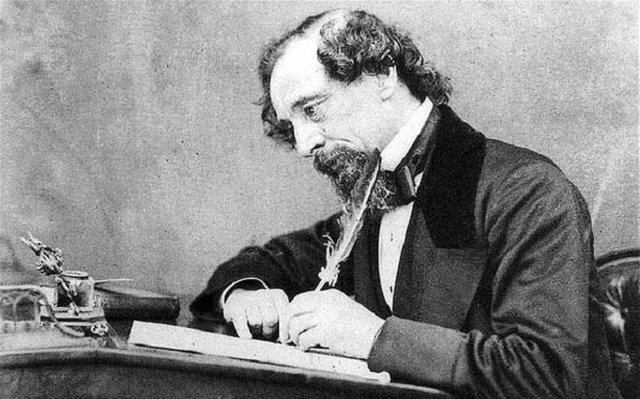Some thoughts about Charles Dickens
Charles Dickens develops all genres - the realistic novel, the satirical portrait, the ridiculous essay - proving a high-minded psychologist and a passionate moralist pathos. He is a self-taught writer who proves his talent at the beginning of his work as a journalist, satirist, and master of the novels that go out into the sublime. He strikes with extremely developed sensitivity and with his noble generosity as a mentor-writer. He provides his authority primarily as an analyst of social life in England at the beginning of the industrial age. He does not have the ambition to interfere with political life but condemns misery and exploitation. Charles Dickens analyzes in depth the spiritual atmosphere of the Victorian era, whose mentality and moral preconditions know very well. He is 25 years old when, in 1837, Queen Victoria ascends the throne of the English Empire. His most significant works appeared after this important historical event for his country.
But the influences that shape his creative life come from an earlier age. He may be considered to be a child of the 1930s, when England's industrial revolution began to give rise to both hopes and fears, euphoria and depression. Charles Dickens was born in a suburb of Portsmouth in 1812. His father, John Dickens, comes from a family of servants and serves in the administration of the Admiralty. In 1816, he was seconded to Chatham, and in 1823 he was a clerk in London. His family settled in a working quarter of the capital. But the father's unpredictability soon brings his home to misery, and he is closed to debt. Charles was forced to work for a while in a footwear manufacturing factory before being accommodated in a boarding house. He studied only three years, and then, in 1827, joined a clerk's office with a lawyer. Desirous of knowledge, he spends his time in his free time to master the stenography, frequenting public reading rooms in London.
Charles Dickens becomes a stenographer in the Morning Chronicle in London. They noticed it in 1835 when he published a series of sketches in the same newspaper, which he signed with the pseudonym "Boz" . He became famous two years later when his first humorous masterpiece, "Aventures of M. Pickwick," was released. In the same year (1837), he married Catherine Hogarth, the daughter of a prominent journalist whose sister Mary is sheltering in her home. She suffers painfully by her death. Deep humiliation forces him to change his writing style. The first remarkable testimony of the change in the atmosphere in his fictional world was his novel Oliver Twist's Adventures. He dedicates his life entirely to literature. His only entertainment is traveling. He enjoys the warm gratitude of readers in England and beyond. In 1840-1841 it was welcomed by readers in the United States. But the sequel, Martin Chuzzlewit (1843), a novel criticizing American materialism, and American amateurs will awaken sharp reactions among Americans.
During the period 1843-1846 Charles Dickens walked through Italy, Switzerland and France, where he met the famous writers of that time. Meanwhile, he continues to write his "Christmas Stories", which began in 1843, which featured "One Christmas Song", "Christmas Bells" (1845). Charles Dickens founded the Daily News and began publishing the "News from Home" magazine, in which he will publish his novels, novels and a children's story "History of England". In 1858, the writer divorces his wife. He then took charge of organizing public readings of his novels in England and the United States. These readings have been a huge success. But exhausted by continuous travels, Charles Dickens is forced to retire at his Gadshil estate, where he dies in 1870, rising to the top of his glory shortly before completing his latest novel The Mystery of Edwin Drood. In his teen years, Charles Dickens has been charging his imagination with personal experiences and with the novels written in the 16th century. He is a particularly zealous reader of the novels of Fielding and Smolet. As a writer, he follows the canons of neoclassical aesthetics: his goal as a novelist is to like and to teach.

Thank you for all this rich history on a man whose books I have enjoyed reading.
You are welcome :)
Hi @godflesh This is a wonderful post!!
In considering why Dickens’s stories are of interest in the modern world, we can point to his rich array of characters and situations. We can make parallels between the episodic and dramatic nature of his novels and the current popularity of TV serials that share this approach. Or we can reflect on Dickens as a commentator on issues that are still relevant today.
Charles Dickens was indeed a master storyteller, and his stories still speak forcefully to us today.
Also, Charles Dickens did not only build a life from becoming a literary legend, an outspoken advocate against social inequality and an everyday expression but he was an early pioneer in many arenas. Dickens created a shelter and academy for women who were seeking refuge from prostitution and is credited with potentially saving the lives of a group of friends after a train crash.
Have a nice night.
I wish you good health, happiness and prosperity.
A hug
thanks :)